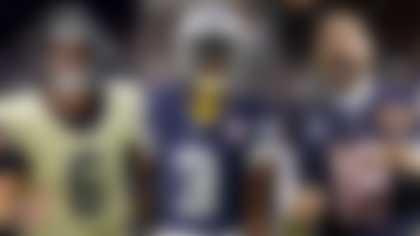Former NFL player and scout Bucky Brooks knows the ins and outs of this league, providing keen insight in his notebook. The topics of this edition include:
-- How the Ravens are fully committing to an option offense.
-- A third-round draft pick who could take the league by storm.
But first, a look at Miami's first major step in building a championship squad ...
* * * **
The football world won't like this comparison but ... Josh Rosencould be the league's next Brett Favre.
The recently dispatched quarterback doesn't have a playing style that mirrors the former three-time MVP, but he has an opportunity to impact the Miami Dolphins like the Pro Football Hall of Fame inductee transformed the Green Bay Packers in the early 1990s after being acquired in a trade following a disappointing rookie season with the Atlanta Falcons.
Now, I know I'm putting lofty expectations on a second-year player attempting to repair his career after an unceremonious dismissal from his original team, but Rosen is in a position to become the franchise quarterback the Dolphins have been chasing since Dan Marino hung up the cleats.
"I believe the kid is a helluva player," said an NFC executive. "He's smart, talented and a solid leader. He's been given a bad rap but he can play. He didn't have a legitimate chance to showcase his talents in Arizona, but I believe he will be a star in Miami with that coaching staff putting in a system that fits his skills as a player. ... It might take him a little time to pop, but I think he will play well down there."
I know that's a strong endorsement for a player with a 55.2 percent completion rate and a 11:14 touchdown-to-interception ratio. However, the former UCLA standout showed flashes of big-time ability during his dismal rookie season, and the Dolphins have enough pieces in place to help him find his groove as a player.
In assistant head coach Jim Caldwell, Miami has a guru in place to groom the young quarterback. The longtime NFL head coach has a track record for helping passers elevate their games (see Peyton Manning, Joe Flacco, and Matthew Stafford). Additionally, he is a terrific communicator with the knowledge, wisdom and intelligence to immediately garner respect from Rosen. Considering the quarterback's inquisitive nature, Caldwell's demeanor and coaching style should bring out the best in the young quarterback.
Chad O'Shea's system should also help Rosen take his game up a notch, as the Dolphins' offensive coordinator builds a scheme around the talents of his top players while also attacking the weaknesses of the opponent.
"I think that you have a foundation and some core beliefs that you have offensively, but I think the key is to do what your players do well," O'Shea told reporters at his introductory press conference. "It's our job as a coaching staff to identify what are the skill sets of the players and how can we utilize [those] skill sets to be a productive offense. That's why we don't talk about specific scheme. We talk about being multiple. We talk about being able to adjust. That's a word that definitely is an important part of our offense is the ability for the coaches to adjust in the way we think as far as our scheme, and our players to be able to adjust and might be able to adjust weekly depending on what we need to do to win the game."
With those thoughts in mind, I believe the Dolphins' offensive multiplicity and adaptability play to Rosen's strengths as a cerebral playmaker from the pocket. He is at his best when given more responsibility at the line, and that's exactly how the Dolphins' scheme could play out based on O'Shea's experience as the New England Patriots' wide receivers coach for the past 10 seasons. He was part of an offensive staff that's used a variety of concepts to put players in prime positions to exploit matchups on the perimeter. In addition, he's witnessed how a wily quarterback can consistently get a team into the best play on every down.
That said, Rosen has to make strides as a player to earn the right to direct the Dolphins' offense. He has to become an efficient distributor with a knack for making quick decisions to exploit defenses. Rosen also needs to avoid the costly turnovers that lead to losses in tightly contested games.
Reflecting on my time with the Packers in the 1990s watching Favre grow from castoff to MVP, he thrived in an adaptable system that put the responsibility on his shoulders to put the offense in the best position to succeed. Although he created big-play opportunities with his magical improvisational skills, No. 4 excelled in an environment with coaching excellence around him. He had a series of high-IQ teachers (see Mike Holmgren, Sherman Lewis, Steve Mariucci and Andy Reid) with the communication skills and knowledge to challenge him and grow his game.
For a player exiting a chaotic environment as a rookie, the stability and consistency of a strong coaching staff and organization can lead to a better than anticipated performance on the field. Most importantly, it can help a top quarterback prospect grow into a franchise QB and team leader.
In a perfect world, that's how the situation plays out for the Dolphins with Rosen becoming a consistent QB1 on a cheap deal that enables them to surround him with high-end talent on the perimeter. The low-cost deal (team only owes Rosen $6.2 million over the next three years with a team option for a fourth year) provides the Dolphins with enough salary cap flexibility to add a handful of marquee free agents to upgrade the critical areas of the team over the next three years.
Considering how the 1990s Packers were able to lure some blue-chip players like Reggie White, Sean Jones and Keith Jackson to the team with their young quarterback growing into a high-end player, the Dolphins' acquisition of Rosen could be the first step toward building a championship squad in South Florida.
TWO-POINT CONVERSION: Quick takes on developments across the NFL
1) How Baltimore is revolutionizing the QB position. The skeptics scoffed at the notion of the Baltimore Ravens running an unconventional run-centric offense in 2019 and beyond with Lamar Jackson at the helm, but the team's decision to stockpile dual-threat quarterbacks suggests John Harbaugh is fully committed to running an offense that might remind people of what they see from Army each week in college football.
With Robert Griffin III and sixth-round draft pick Trace McSorley sporting impressive resumes as read-option/RPO (run-pass option) specialists, the Ravens have three quarterbacks on their roster with the capacity to run many of the option concepts that have revolutionized the high school and college football landscape. Now, I'm not saying Griffin or McSorley could unseat Jackson as the team's QB1, but the Ravens have a stable of quarterbacks with the potential to make plays as runners or throwers.
For Greg Roman, the presence of three athletic quarterbacks enables him to continue to run his radical, run-heavy system with or without Jackson in the game. Naysayers have suggested NFL teams can't rely on a running quarterback as a starter due to durability concerns, but the Ravens have essentially bought insurance against needing to scrap their offense in the middle of the season by stockpiling dual-threat quarterbacks on the roster.
Last year, I believed the decision to keep Griffin on the roster as the QB3 was partially due to his game closely resembling Jackson's playing style. Although he was signed prior to Jackson's arrival as a first-round pick, I thought it was part of a bigger plan to revamp the Ravens' offense into a spread offense that mirrors the dynamic units frequently seen on Saturdays.
To that point, the Ravens' selection of McSorley in last weekend's draft confirms that transformation. The sixth-round pick from Penn State is a slippery dual-threat playmaker with outstanding athletic ability. McSorley not only blazed a 4.57-second 40-yard dash at the NFL Scouting Combine, but he popped a 33-inch vertical jump and a 9-foot-7 broad jump. With the 6-foot, 202-pounder also clocking a 4.12-second 20-yard shuttle, the Ravens grabbed a quarterback prospect with athletic traits that are in Russell Wilson's range based on his performance at the 2012 combine (4.55 40, 34-inch vertical jump, 9-10 broad jump, 4.09 20-yard shuttle).
I'm not suggesting McSorley is a future five-time Pro Bowl selection, but he certainly gives the Ravens another athletic quarterback with experience executing option reads. Considering his intelligence, toughness and leadership skills, he is the perfect option quarterback to keep in the stable behind Jackson.
"I think he's a football player and everything that entails," Baltimore Ravens general manager Eric DeCosta told Pro Football Talk. "His skill set is varied and multiple. He's fast, he's strong, he's tough, he's a playmaker, he's a football player. We've seen teams, for instance, the New Orleans Saints with Taysom Hill, we've seen other teams find ways to play with players like this and they can help you win football games."
With the Ravens fully committing to an option offense that will make them the Army of the NFL, it was a wise move to add another athletic quarterback with versatility, toughness and ball-handling skills who can step in for Jackson in a pinch during the regular season.
2) A look at the 49ers' new offensive hybrid playmaker. If I'm a fantasy football player looking for a hidden gem, I would keep close tabs on Jalen Hurd's progress this summer. The San Francisco 49ers' third-round draft pick could emerge as one of the league's premier offensive weapons as a Swiss Army knife in Kyle Shanahan's offense.
Granted, the hype train is in full effect following draft weekend, but the 6-5, 226-pound playmaker has all of the tools to create headaches for defensive coordinators around the league. As a legitimate hybrid with extensive experience as a running back and pass catcher, Hurd can align anywhere on the field from "Z" (flanker) to "H" (flex tight end) to running back in the 49ers' scheme. Most importantly, he can thrive at any of those positions based on his performance as a collegian.
Think about it this way: Hurd posted a 1,000-yard season as a running back at Tennessee in 2015 and outplayed a future NFL Offensive Rookie of the Year (Alvin Kamara) to earn the RB1 job. Additionally, he nearly notched a 1,000-yard season as a receiver last season at Baylor after making a surprising position change following his departure from Tennessee. Although we've seen some guys succeed after position switches, it is uncommon for a player to display high-end skills at each position.
"I mean, he can do about everything," said Shanahan at a post-draft press conference. "I mean, I think if he would have stayed a running back, I think he would have gotten drafted as an NFL running back. Today he got drafted as an NFL receiver, kind of. I believe if he tried to play tight end, he would have gotten drafted as an NFL tight end. That's a pretty unique thing to have. I don't remember being able to say that about any player I've studied before. So, it's neat to be able to do that and he can help us out in a lot of different ways."
With that in mind, you can already envision how Shanahan could deploy Hurd as a designated playmaker on the perimeter. He can play as the third or fourth receiver in the team's spread formations and move into the backfield as a legitimate running threat as a quasi-running back. With defenses unable to account for his whereabouts until the 49ers break the huddle, Shanahan could take advantage of personnel gaffes and mismatches to create explosive plays. Most importantly, it is a way to maximize the talents of a gifted player with unique abilities.
"What's neat, you can see a lot of guys who can fluctuate and go a bunch of different ways," Shanahan said. "What's neat is when you have a receiver who can fluctuate like that, but also it's the mentality to go play at running back or to play tight end. And it doesn't mean you want to put him there all day, but just to have the threat to do that. There's a lot of receivers who maybe could have the ability to do it, but it's very rare to have the ability and the mentality with it because playing running back is a lot different than playing receiver and it's a lot different than playing tight end and he's capable of doing it all and not too stressed out [about] which one it's going to be because I think it will be a little bit of everything."
Given Hurd's versatility and Shanahan's offensive creativity, the 49ers could unleash a unique offensive weapon on the football world that takes the NFL by storm.
Follow Bucky Brooks on Twitter @BuckyBrooks.












